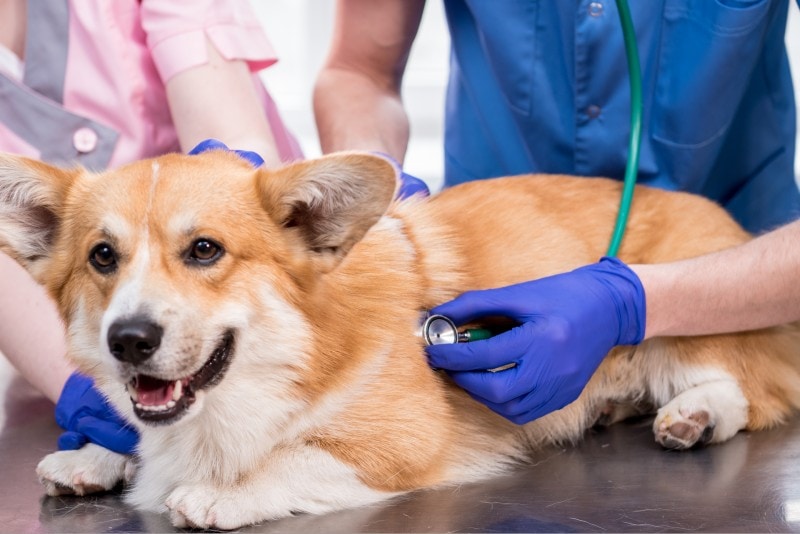
Click to Skip Ahead
With just under 10% of the human population affected by asthma, there is a good chance that you either have it, or you know someone that does. Many people live with asthma as mild irritation, while others suffer from severe, life-threatening attacks where they are unable to breathe. What about dogs? Do dogs get asthma?
The answer to that question is not quite as straightforward as you might think. The short answer is, sort of.
The disease as we know it in humans shares some common features with what some people refer to as canine asthma, but there are also some important differences. So much so that, in dogs, the condition is more accurately described as canine allergic bronchitis or chronic bronchitis. To better understand this condition, we need to first take a look at the disease classically known as Asthma.
What Is Asthma?
Let’s begin by defining asthma in humans so that we can see how it compares with canine allergic bronchitis.
The pathophysiology of asthma is still not completely understood, and in humans, it usually starts during childhood. The severity of asthma differs from person to person, as do the things that might trigger an attack. During an asthma attack, the tissue lining the small airways (mucosa of the bronchi) in the lungs becomes thickened, making it hard to breathe, sometimes made even worse by the production of mucus.
Asthma attacks can be triggered by exercise, cold air, physical irritants like dust or chemical fumes, or allergens like pollen, mold spores, and pet dander. The main form of treatment in humans is an inhaler, which delivers an aerosolized steroid solution directly into the airways, reducing inflammation and swelling.
Although it is not fully known why one individual will develop asthma and another will not, there is evidence to suggest that it is a trait that can be passed onto offspring. It is a disease that has no cure but can usually be effectively managed with medication and lifestyle changes.
Similarly, cats have been found to also spontaneously develop a form of lower respiratory disease characterized by swelling of the bronchial mucosa, very similar to asthma in humans. Around 1–5% of cats have the condition, with the Siamese breed apparently more likely to be affected. They tend to suffer from a more progressive form of the disease, with occasional “attacks” that result in severe difficulty breathing, and many cats with asthma are placed on similar inhalers to those used in humans.

Do Dogs Get Asthma?
In dogs, the appearance and progression of lower airway disease are slightly different.
Experimentally, dogs have been triggered with repeated exposure to certain allergens to produce clinical signs consistent with asthma and even produce offspring that are born with a pre-existing sensitivity to those same allergens. This is a good demonstration of immune transfer from parent to offspring, but not necessarily the gene for asthma.
In reality, dogs are not commonly seen for this type of inflammatory airway disease until later in life and tend not to have had episodes of respiratory distress, wheezing, or coughing from a young age, as is the case with humans and cats.
How Is Allergic Bronchitis or Asthma Diagnosed in Dogs?
The condition sometimes referred to as “asthma in dogs” usually presents as a persistent cough, which progresses in frequency and severity over a period of months or years. If investigations to rule out infection, heart disease, parasites, or any other potential causes are negative, the presumptive diagnosis of allergic bronchitis is usually made.
X-rays may show thickening of the bronchi, but this will depend on how severe the disease is, or for how long it has been going on.

What Causes Allergic Bronchitis in Dogs?
As the name suggests, it is believed that most chronic bronchitis cases have an allergy basis, but the progression of the condition tends to be something of a self-perpetuating problem. With long-term exposure to an allergen, the airways become inflamed more regularly, and that can lead to permanent thickening of the bronchi. This then makes breathing more difficult and leads to more coughing, which creates further inflammation of the airways.
Once this happens, the condition is more consistent with Chronic Obstructive Pulmonary Disease (COPD).
How Is It Treated?
This is another way in which canine allergic bronchitis differs from human and feline asthma. In the case of asthma, treatment is usually limited to the time of an attack, unless there are significant changes in the airways or more persistent clinical signs. In dogs, the respiratory signs (coughing, wheezing) occur regularly or are constant, so treatment usually involves starting them on long-term oral corticosteroids, sometimes with the addition of bronchodilators. Some cases will also incorporate the use of an inhaler, either as a regular part of treatment or to use when respiratory signs flare up.
Being on long-term steroids can weaken your dog’s immune system, as well as cause a number of other side effects. Coupled with the chronic airway inflammation, this can make these dogs much more susceptible to secondary infections, so they must be monitored carefully, and have checkups with the vet regularly.
Conclusion
Asthma in dogs is not really asthma at all but does share some similarities with the condition. Dogs rarely experience true asthma attacks but a more progressive form of airway inflammation known as chronic bronchitis. Most dogs with chronic bronchitis will need lifelong medication to manage the condition once the clinical signs reach a certain point, but there are a number of ways that we can help reduce inflammation and the severity of their signs.
Featured Image Credit: Edgar Feliz, Shutterstock








